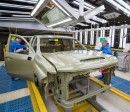The chip shortage that’s been wreaking havoc in the automotive world is expanding to other industries, and credit card deliveries are now impacted as well.
The chip crunch is impacting the production of credit and debit cards, as manufacturers don’t have the necessary components to build them.
Due to the disrupted supply chain, customers must wait approximately 8 weeks for new cards to ship.
While chip makers have invested aggressively in production capacity, their output is aimed at their biggest customers. With PC and phone sales going down, carmakers are securing the lion’s share, especially as the demand in this market is still strong.
Customers are recommended to switch to alternative solutions, such as Apple Pay and Google Pay. Both allow them to make payments, therefore helping them cope with the lack of a physical card.
The chip shortage continues to be a major concern in the majority of industries, except for PCs and smartphones. Sales in these sectors have declined in the last quarter, especially as market saturation has been reached following two years of growth.
With the demand here going down, chipmakers are now investing in retooling to build more chips for industries where sales remain strong. Carmakers are still battling a constrained inventory, and the consensus right now is that the chip supply will still be challenging in 2023.
General Motors’ CEO previously predicted the chip crunch could continue even after 2023. This forecast aligns with tech giant Intel’s vision. The company said the chip supply wouldn’t recover in full earlier than 2024, especially as the world needs all investments in capacity to come to fruition.
Research firm IDC believes this strategy could eventually backfire. Analysts warn that focusing aggressively on production could lead to a flood of chips. As such, manufacturers could end up building more chips than customers can buy.
The world is far from this moment, and more industries continue to battle the very constrained inventory. Just earlier this week, it was revealed that even the production of driving licenses is impacted in some regions. New drivers are waiting for their documents for up to several months, all because of the same reason.
Authorities don’t have the necessary chips to produce the driving licenses, and as a result, the shipping has been delayed for several months.
Anticipating when the chip shortage could be resolved in full is still impossible at this point. The geopolitical tension, mixed with rising inflation and increasing costs of materials, causes severe instability in the market, including even in the production of credit cards. Toyota, for example, says its yearly output could be impacted by as much as 10 percent due to the uncertainty that’s currently disrupting its supply chain.
Due to the disrupted supply chain, customers must wait approximately 8 weeks for new cards to ship.
While chip makers have invested aggressively in production capacity, their output is aimed at their biggest customers. With PC and phone sales going down, carmakers are securing the lion’s share, especially as the demand in this market is still strong.
Customers are recommended to switch to alternative solutions, such as Apple Pay and Google Pay. Both allow them to make payments, therefore helping them cope with the lack of a physical card.
The chip shortage continues to be a major concern in the majority of industries, except for PCs and smartphones. Sales in these sectors have declined in the last quarter, especially as market saturation has been reached following two years of growth.
With the demand here going down, chipmakers are now investing in retooling to build more chips for industries where sales remain strong. Carmakers are still battling a constrained inventory, and the consensus right now is that the chip supply will still be challenging in 2023.
General Motors’ CEO previously predicted the chip crunch could continue even after 2023. This forecast aligns with tech giant Intel’s vision. The company said the chip supply wouldn’t recover in full earlier than 2024, especially as the world needs all investments in capacity to come to fruition.
Research firm IDC believes this strategy could eventually backfire. Analysts warn that focusing aggressively on production could lead to a flood of chips. As such, manufacturers could end up building more chips than customers can buy.
The world is far from this moment, and more industries continue to battle the very constrained inventory. Just earlier this week, it was revealed that even the production of driving licenses is impacted in some regions. New drivers are waiting for their documents for up to several months, all because of the same reason.
Authorities don’t have the necessary chips to produce the driving licenses, and as a result, the shipping has been delayed for several months.
Anticipating when the chip shortage could be resolved in full is still impossible at this point. The geopolitical tension, mixed with rising inflation and increasing costs of materials, causes severe instability in the market, including even in the production of credit cards. Toyota, for example, says its yearly output could be impacted by as much as 10 percent due to the uncertainty that’s currently disrupting its supply chain.






